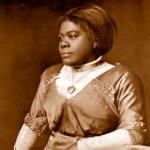 May 18, 1955 Mary Jane McLeod Bethune, educator and civil rights leader, died.
May 18, 1955 Mary Jane McLeod Bethune, educator and civil rights leader, died.
Bethune was born July 10, 1875 in Mayesville, South Carolina. She attended Scotia Seminary (now Barber-Scotia College) from 1888 to 1894 and then Dwight Moody’s Institute for Home and Foreign Missions (now Moody Bible Institute). In 1904, Bethune rented a small house in Daytona Beach, Florida and started the Literary and Industrial Training School for Negro Girls with five students.
By 1910 enrollment had rose to 102 and in 1923 the school merged with the Cookman Institute for Men, became co-educational, and eventually became Bethune-Cookman University. Bethune served as president of the college from 1923 to 1942 and 1946 to 1947. From 1917 to 1925, Bethune served as the Florida chapter president of the National Association of Colored Women and in 1924 she served as national president. She also served as the president of the Southeastern Federation of Colored Women’s Clubs from 1920 to 1925. In 1935, Bethune founded the National Council of Negro Women to bring together 28 different organizations to facilitate improvements in the quality of life for women and their communities. In 1938, the NCNW hosted the White House Conference on Negro Women and Children.
Also in 1938, Bethune was appointed director of the Division of Negro Affairs in the National Youth Administration, making her the first African American female federal agency head. Bethune had a close relationship with Eleanor and Franklin Roosevelt and used that to make them aware of the concerns of black people. Bethune dedicated her life to the education of blacks and whites and in 1939 stated “not only the Negro child but children of all races should read and know of the achievements, accomplishments and deeds of the Negro. World peace and brotherhood are based on a common understanding of the contributions and cultures of all races and creeds.”
Bethune was awarded the Spingarn Medal by the NAACP in 1935 and in 1949 she became the first woman to be given the Medal of Honor and Merit, Haiti’s highest award. In 1973, Bethune was posthumously inducted into the National Women’s Hall of Fame and in 1974 a sculpture in her honor was unveiled in Washington, D. C. In 1985, the United States Postal Service issued a commemorative postage stamp in her honor and in 2004 her last residence became the Mary McLeod Bethune Council House National Historic Site. There are also a number of schools across the nation named in her honor. Bethune-Cookman University now has 36 buildings and educates nearly 4,000 students a year.

No comments yet.